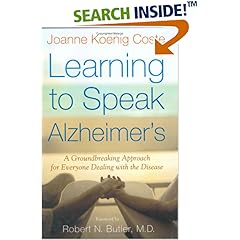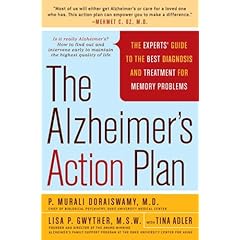A recent article on CNN.com, Five Ways to Keep Alzheimer's Away, mentions five ways to keep your memory sharp: antioxidants, fish oil supplements, phosphatidylserine supplements, curry, and Cross-training your brain. This article is part of a discussion about Alzheimer's and yesterday's news about how
herbal supplement Ginkgo biloba doesn't stop Alzheimer's. I believe that supplemnts are a good part of any regimen to improve health. Scientific evidence supports the value of taking supplemens and indicates that supplements can
help stave off a long list of diseases including heart disease, cancer, and Alzheimer's.
However, I am starting to get the feeling that people believe there is magic in those pills; and that, they can start taking these supplements in lieu of healthy life practices and get a positive result by pills alone.
It is my belief that supplements are worthwhile and a great way to stay healthy. However, it is also necessary to take good care of you body and address medical issues if you want to stay healthy and disease free in older age.
For example, I recently wrote about how
high cholesterol in your 40s increases the odds of contracting Alzheimer's--
by 50 percent.
I believe most people know if you suffer from hypertension (
high blood pressure) the odds of suffering from any number of diseases rises dramatically as you age. Less well known is the fact that if you have a
big belly in middle age the chances that you could suffer from dementia are tripled.
Previously I wrote an article about Alzheimer's and the likely devastating effect it could have on
baby boomers. I suggested a list of things that are proactive and have measured scientific benefits. In addition to the issues with high blood pressure, high cholesterol, and a big belly I suggested a few additional ideas that I believe can help.
A recently released study showed that regular
exercise is one of the best ways to reduce your risk of dementia and can help slow progression of Alzheimer's disease. Another recent study at Harvard found that those who regularly drank a
cocoa flavanol rich beverage had an eight percent
increase in brain blood flow after one week, and 10 percent increase after two weeks. Studies also show that people with higher levels of
vitamin B12 were six times less likely to experience brain volume loss.
These are the kinds of things I believe raise the odds of fighting off Alzheimer's and dementia in older age. Please keep this in mind, the longer you live the greater the chance you will suffer from dementia. Once Alzheimer's or dementia present it is to late. So the time to get started is now.
My mother suffers from Alzheimer's and is 92 years old. Prior to the age of 85 she never suffered a major illness, never had an operation, and was still functioning on her own.
Bob DeMarco—My ProfileSubscribe to The Alzheimer's Reading Room--via Email
Five ways to keep Alzheimer's away
By Elizabeth Cohen
CNN Medical Correspondent
(CNN) -- Blanche Danick may be 86 years old, but she's pretty hip. She keeps up with all the latest health news, and a while back, she called her daughter wanting to know whether she should start taking the herb ginkgo biloba. She'd heard it might stave off Alzheimer's disease.
"I told her not to bother, that it wouldn't make much of a difference," says her daughter, Edythe London, a professor of psychiatry and pharmacology at the University of California, Los Angeles. "On the basis of what I've read, I don't think it staves off dementia."
London's advice makes a lot of sense, according to a study out this week in the Journal of the American Medical Association. Ginkgo is a top-selling herb and has been hailed by some as a memory-booster, but the new University of Pittsburgh study found it didn't help prevent Alzheimer's or other forms of dementia in more than 3,000 elderly study subjects.
Ginkgo manufacturers say this isn't the first -- or the last -- word on the herb. "There is a significant body of scientific and clinical evidence supporting the safety and efficacy of ginkgo extract for both cognitive function and improved circulation," said Mark Blumenthal, executive director of the American Botanical Council.
London's still skeptical. "But I do tell my mother there are other things she can do," says London, who's studied the brain and aging. "I tell her to go out and do things and see people every day and be active." Studies have shown that physical exercise, the kind that keeps the heart healthy, also keeps the brain healthy, according to the National Institutes of Health's Cognitive and Emotional Health Project.
People are like rats, London says. "If you put a rat in a cage by itself, it won't do well on cognitive tests. But if you give it toys and put other rats in its cage, they're going to be smarter rats."
In addition to playing with toys and hanging out with your fellow rats, here are five other tips for keeping your memory sharp. London says they help work on memory centers of the brain, including the cerebral cortex and the hippocampus, identified in the diagram above.
1. Antioxidants
London makes sure her mother takes vitamins A, C, and E. They're antioxidants, which prevent cell damage and are believed by some to slow down diseases of aging. "There are studies that suggest antioxidants might prevent dementia," she says.
2. Fish oil supplements
Dr. Gary Small, director of the UCLA Center on Aging, says aging brains show signs of inflammation, and fish oil has anti-inflammatory properties.
3. Phosphatidylserine supplements
Phosphatidylserine is a lipid found naturally in the body. Small says he's not 100 percent convinced these supplements will help stave off dementia, but they're worth a try. "If I start having memory problems when I get older, I'll give them a trial run and see if they help," says Small, author of the new book "iBrain: Surviving the Technological Alteration of the Modern Mind."
4. Curry
Small, who's 57, says that as he gets older, he might also try eating more foods with curry in them. "Some studies in Singapore show that those who ate curry once a week had better memory scores," he said.
5. Cross-training your brain
"Our brains can be made stronger through exercise," says Andrew Carle, assistant professor of in the department of health administration and policy at George Mason University. "In the same way physical exercise can delay many of the effects of aging on the body, there's some evidence cognitive exercise can at least delay the onset of Alzheimer's."
But Carle says it's not enough to do just one kind of brain exercise. "Doing a crossword puzzle every day is good, but it's the equivalent of doing only pushups -- your arms will get strong, but not the rest of your body."
He recommends doing other activities in addition, such as computing numbers in your head instead of using a calculator, or using one of the "brain gym" computer games designed to enhance brain function.
As for London, who's 60, she thinks her best bet at staving off dementia doesn't come in a bottle, or on a dinner plate, or in a computer game. "I'm going to keep working on my research, and surround myself with young people, and do a lot of exercise," she says. "I'm going to be a happy old lady. That in and of itself is going to do a lot of good for my brain."
Living Alzheimer's From the Front Row
Alzheimer's Reading Room: The number one site on the Internet for current information, research, caregiver tools, and insight into Alzheimer's disease.
 I often use the term "living Alzheimer's from the front row". This term describes caregivers and others that watch Alzheimer's develop 24/7. Once the disease strikes they get to witness the craziness of it all. On one hand, you have the person suffering from Alzheimer's; on the other hand, you have the person responsible for caring for that person. Unless you are an Alzheimer's caregiver it is almost impossible to either understand or comprehend what it is like living in the front row.
I often use the term "living Alzheimer's from the front row". This term describes caregivers and others that watch Alzheimer's develop 24/7. Once the disease strikes they get to witness the craziness of it all. On one hand, you have the person suffering from Alzheimer's; on the other hand, you have the person responsible for caring for that person. Unless you are an Alzheimer's caregiver it is almost impossible to either understand or comprehend what it is like living in the front row.


